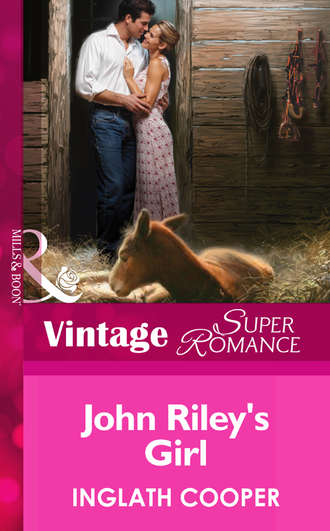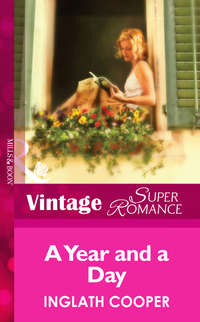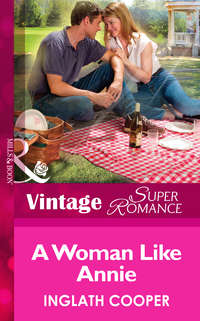
Полная версия
John Riley's Girl
“Those were my wife’s flowers you just spit on,” he said, the words curt.
The man wiped the back of his hand across the tobacco leak at the corner of his mouth. “Hey, bud, I’m really sorry.”
“Next time maybe you could have a little more courtesy for where you’re aiming.”
“No problem.” The man grabbed his tools and trotted back to his truck, lobbing worried glances over his shoulder as he went.
John snatched the hose from the side of the house, turned on the faucet and rinsed every speck of tobacco juice from the flowers, turning them white again.
He looked down the hill at the farm spread out below with its bright spots of color. After Laura had found out she was sick, she had begun planting things everywhere. Pear trees, peach trees, boxwoods. Her favorite had been the white azaleas. She had never said it, and John would never have put his thoughts into words, but he knew it had been her way of leaving something of herself behind. When he had first realized what she was doing, he couldn’t look at her without going off by himself and crying in impotent rage. He had never let her see him. And it was now one of his greatest regrets. He’d wanted to be strong for her, to pretend that everything was going to be all right, when they both knew that it wasn’t. He wished now that he’d let her see his sadness. He’d tried to do what he thought was the right thing for her. It was only after she died, unexpectedly one night, that he realized she would never know how great his loss had been.
And for that he couldn’t forgive himself.
Looking back on it, he’d thought going on with their lives was the right thing to do. If they saw the doctors, underwent the treatments, then she would get well. Wasn’t that how it was supposed to work? Part of that had to be believing she would get well. If they talked about the possibility that she might die, then it might happen.
And it had.
He hung the hose up, stomped back across the yard to the white-and-green barn where Hank Owens stood in the middle of the big sliding doors, arms folded across his chest, a frown on his weathered face.
“I know I’m a jackass, Hank. I don’t need you to tell me again.”
Hank stopped him at the door with a gloved hand. “I don’t blame you for tearing into his butt. I saw how hard she worked on those darn flowers.”
A mixture of approval and disapproval laced his voice, deep and resonant, like a Baptist preacher’s at a revival. To most of the world, Hank was an intimidating man. He had shoulders wider than a stall door, hands callused from decades of hard work, legs slightly bowed from a lifetime of sitting on a horse. He had been at Rolling Hills longer than John had been alive, and John had no illusions about who was the glue that had held the place together in the first few months after Laura had died.
“It’s been almost two years, John.” Compassion softened the rough edge of Hank’s voice. “Maybe you oughta talk to somebody about this. Somebody impartial.”
“So they can tell me how it’s normal to be angry because my wife died long before I figured out how to make her happy?”
Hank shook his head and managed to look more worried. “She was happy, John.”
“Not the way she could have been if I—”
“If you’d what?”
“Nothing,” he said, putting brakes on the conversation. Talking about it didn’t do any good, anyway. He couldn’t change any of it—couldn’t go back and make himself a better husband. No matter how much he might wish for the chance.
“You gotta get a handle on this, son. Somehow. Someway.” Hank’s words were low and insistent. “If not for anybody else, then for her.” He tipped his gaze toward the road at the foot of the driveway where a school bus had just slowed to a halt.
The stop sign popped out from the side, warning lights flashing. The door opened, and out bounded Flora, pigtails bobbing, her Black Beauty lunch box in one hand, a Barbie backpack slung over her other shoulder.
She looked both ways before crossing the road, just as John had taught her. His heart swelled. She walked until she reached the gates to the farm, but as soon as her sneakers left the main road, she was off and running, up the long driveway to the house.
In the months after Laura had died, he had insisted on picking Flora up from school every day, but she had wanted to ride the bus and had finally told him so. “Daddy, I’ll come back. I won’t leave like Mommy did. I promise.” Her intuition had been entirely too accurate for a seven-year-old. Enough so that he had given in and made it a daily struggle not to let her sense his irrational fear that he would somehow lose her, too.
She was skipping now, zigzagging back and forth on the hardtop driveway. Halfway up, she stopped and picked a cluster of yellow buttercups, which he knew would be for Sophia.
He waited where he was, raising a hand in greeting when she looked toward the barn and caught sight of Hank and him. She made an all-out sprint across the grass then, the smile on her face putting that now-predictable squeeze on his heart. The strength of I’ll-do-anything-for-you love was something he had never understood until he experienced it firsthand.
“Daddy!” Her voice was strong and clear, and it carried across the wide expanse of lawn that stretched between the house and the brood-mare barn.
“Hey, sweet pea. Looks like you could just about outrun Naddie today.”
The sound of his daughter’s laughter was the only thing capable of thawing the coldness Laura’s death had left inside him. Flora loved nothing more than being compared to Nadine, the two-and-a-half-year-old filly who was all but guaranteed to become cutting-horse royalty.
Nadine’s entrance into the world had been anything but easy. They had nearly lost her, and once her spindly legs had found their way to the ground, the mare had rejected her. By all logic, the foal should have died. But she had more than her share of fight in her. John had his own belief about the connection between the young horse and his daughter. From the first moment Flora had stuck her hand through the rails of the foal’s stall, a bond had formed. Flora had witnessed her own mother’s extraordinary will to live, and John could only think that on some level, she and the young filly both understood what it was to fight for life and refuse to let go.
Ten feet from the barn door, Flora dropped her backpack and lunch box, and whirled at John like a tiny tornado, launching herself into his arms.
“Whoa there, little pony.”
She giggled again, locking her arms around his neck. Sweet emotion flooded through him. Love. Pure, simple, undiluted, unconditional. There were no strings attached, no “I’ll-love-you-forever-ifs.” It simply was.
“Are we having a circus, Daddy?”
“All but,” John said, ignoring Hank’s look of disapproval. “No, honey, those tents are for a class reunion.”
“What’s a reunion?”
“It’s when a bunch of people get together and talk about things that don’t matter anymore.”
“Oh. If it doesn’t matter, then why are you having it?”
“Because sometimes grown-ups have to do things they’d rather not do.”
“Why?”
“Because they’re grown-ups.”
More head shaking from Hank.
“Hi, Hank,” Flora said from her position in John’s arms.
“Hey, itty-bitty.” Hank tugged on one of her pigtails. “How was school today?”
“Good. Guess what I did?”
“Something smart, I’ll bet.”
“I drew a picture of Naddie.”
“Can I see it?”
Flora unzipped her book bag, pulled out a piece of green construction paper with an orange horse on it.
“That’s a mighty fine likeness,” Hank said.
“It sure is,” John agreed.
“Can I go see her?”
John set his daughter down. “You know Sophia’s got your snack waiting.”
“Just for a minute?”
“All right.”
She took his hand, then held out the other for Hank, skipping between them down the center aisle of the barn and chattering about her day along the way. He and Hank responded at the appropriate moments, smiles on both their faces. Hank loved her as if she were his own, and John was glad of it. If Laura had taught him anything, it was the value of love. That you could never have too much or give too much. He only wished he’d learned that lesson sooner. It was such an easy thing to give. Or it should be, anyway.
Outside, they crossed another expanse of grass and made their way into the barn where the two-year-olds were kept. A chorus of whinnies announced their entrance.
“I believe Miss Nadine knows you’re here,” Hank said.
“She always knows, doesn’t she, Hank?”
“Yep. She sure does.”
Hearing her name, the filly let out another loud whinny from her stall some twenty feet away.
“Just a minute, Naddie.” Flora darted into Hank’s office and charged back out a couple of seconds later with the filly’s customary afternoon carrots.
John and Hank shook their heads. By the time they caught up with her, Flora was already in the stall. The chestnut filly used her soft muzzle to gently poke about Flora’s body in a game of find-the-carrot. Flora giggled when Nadine nosed her right pocket and followed it up with a prod at her armpit. The horse reached around then and found what she was looking for, the three carrots sticking out of Flora’s back pocket. She let out a soft nicker that clearly meant: “I won—now give them to me.”
“Okay, okay.” Flora pulled one from her pocket and gave it to the young horse, who took one polite bite at a time, her beautiful head bobbing in enthusiasm.
“She looked pretty good on the lunge line this afternoon,” Hank said. “The stiffness in that right leg seems to have worked itself out.”
“No bute?”
“Nope.”
“Good. Let’s baby it a while longer, though.”
“Daddy?”
“What, sweet pea?”
“When can I ride Naddie?”
“Right after you start dating.”
Hank shook his head again and chuckled.
Flora gave him a look that would no doubt be perfected by the time she actually did start dating.
“Someday,” he said, refining his answer. “Naddie’s still green, honey. Popcorn is exactly what you need right now.”
“But Popcorn is slow.”
“Slow is good.”
A rumble sounded in the sky above the barn. Just as John reached to pull Flora out of the stall, a military jet roared over, so low it sounded as if it had grazed the very top of the barn roof. Nadine snorted, danced sideways, eyes wide, head high.
“There’s got to be something we can do to get them to alter their flight path,” Hank said as the sound faded. “Somebody’s going to get hurt.”
John sighed. He’d made a dozen phone calls. All to no avail so far.
The farm lay in the direct path of the drills the jets conducted periodically. There seemed to be no rhyme or reason to their schedule so that they never knew when one would thunder over, so low they could see the pilot if they looked up.
“It’s all right, girl,” he said now to Nadine. And then to Flora, “Sophia’s going to fuss if you don’t get those cookies while they’re warm. Why don’t you go on up to the house now?”
Flora reluctantly said goodbye to Nadine who let out a protesting whinny.
“I’ll be back,” she promised. “Be good.”
“Fat chance,” Hank said. “As soon as you get out the barn door, we’ll have Miss Prima Donna on our hands again.”
Flora giggled. “She’s not bad, Hank.”
“Oh, just perfectly willing to kick the stall door down if you don’t come when she wants you to.”
“I’ll make some more calls about the jets, Hank,” John said over his shoulder as he and Flora headed out of the barn.
“Somebody ought to be able to do something,” Hank said.
The cell phone in John’s pocket rang. “You go on up, honey. I’ll be right behind you.”
“Okay, Daddy.” She sprinted off across the yard, disappearing through the back door even as he reached for the phone, punched a button and said, “Hello.”
“Hey. Hear you’re havin’ a reunion out there.”
John looked down at the grass, gave a renegade dandelion a booted swat. “Hey, Cleeve. Wish I could deny it.”
“What’d I tell you about being the nice guy?”
“I’m not feeling too nice these days.”
“Well, this oughta at least qualify you for sainthood or somethin’ darn close.”
“Somethin’.” John smiled, Cleeve’s intention, he was sure. Getting John to smile had been one of Cleeve’s goals for the better part of the past two years. It wasn’t often he succeeded, but Cleeve was a firm believer in humor’s ability to heal most of life’s gashes. “When’d you get back?”
“Just last night. Late. If they weren’t willing to pay so dang much for a good bale of horse hay down there, I’d find somewhere other than Florida to sell it. Takes me a few days to catch up on my beauty sleep.”
“Not that you’re vain or anything.” Cleeve Harper ran a dairy on the other side of the county. He was the closest thing John had to a best friend, if men admitted to such things. They’d known each other since the first day of first grade, had both been into horses and cattle when other boys they’d grown up with had been playing with construction sets and footballs.
“You gotta admit it’ll be interesting to see how all those girls turned out tonight.”
John tipped the bill of his baseball cap back, rubbed the spot in the center of his forehead where a dull ache had begun. “There’s that, I guess.”
Cleeve chuckled. “So you think she’ll—”
The cell phone squawked, then blanked out for a second.
“I didn’t catch that,” John said when it cleared up again.
“I said, do you think she’ll come?”
“Who?”
“You know who.”
Just the words sent a warning signal off inside John. All his vital organs seemed to have locked up, and breathing suddenly required a conscious effort. “Why’re you askin’?”
“I actually got a chance to watch her on that news show while I was waiting on somebody yesterday morning. She’s pretty damn good. And good day, she turned out to be a beautiful woman.”
“Yeah?” John tried for indifference. The few times he had accidentally caught a glimpse of her on TV, he had seen very little in Olivia Ashford, cable news anchor, to remind him of the girl he had known. But then he’d wondered if that girl had ever existed outside his imagination, anyway.
“I wouldn’t worry about it. I’m sure she’s too busy with the glamorous life to come to a high-school reunion.”
“No doubt.” John aimed the subject in another direction altogether. “Macy comin’ with you tomorrow night?”
“Hell, I don’t know, John. Half the time I don’t know whether she’s even coming home at night.”
“You in the mood for a lecture?”
“Nope.”
“Well, let me know when you are.” Cleeve had a knack for picking women who needed fixing, the majority of whom seemed to always end up on the other side of just-beyond-repair.
“Those calves are ready for you to pick up.” Cleeve said, his turn to change the subject.
“I’ll probably get over there this weekend. Maybe on Saturday.”
“All right then. See ya tonight.”
“Yeah, see ya.” John snapped the phone shut, shoved it in his pocket and refused to stew over Cleeve’s wife and the rumors that kept crossing his path when they were the last thing he wanted to hear. Besides, he couldn’t get away with crediting the burning in his stomach to the woman he personally thought was making his best friend miserable. No, that went to another woman. To his left, the breeze caught the flag on top of one of the big white tents and flapped it back and forth, while his thoughts went swerving to the part of the conversation that had shaken him up inside like a runaway roller coaster.
In truth, it had never even occurred to him that Olivia Ashford might come this weekend. Had he thought it the remotest of possibilities, he would never have agreed to have the reunion here, much less be anywhere within the vicinity himself.
But there’d been no reason even to entertain the notion. She had left Summerville without so much as a backward glance just a few weeks after graduation, and in all the years since, he tried not to think about her. Ever.
There were just some things in life better left alone. For him, this was one.
“Daddy!” Flora hung halfway out the screen door at the back of the house, waving at him. “Aunt Sophia says the cookies are getting cold!”
The impatient summons from his seven-year-old daughter reminded John that he was standing in the middle of his front yard, dwelling on a past that had nothing to do with the present—a past that no longer mattered. He waved at Flora. “Be right there!” he said, and headed across the yard. Olivia Ashford wasn’t even real to him, anymore. She was just a memory.
Nothing more than a memory.
CHAPTER THREE
Starting Points
CLEEVE HARPER DROPPED his cell phone into the front zipper pocket of his overalls, leaving the antennae sticking out one side. The reception here on the farm was hit or miss at best, and he’d taken to driving around in the air-conditioned interior of his tractor with his phone pointed toward the heavens like the new-millennium farmer he was, as if to miss one call would send his crops into a tailspin.
Summerville’s very own GQ farmer. That was what John called him. He’d even taken a picture of Cleeve one afternoon planting corn and sent it in to the County Times. Cleeve still owed him for that one, matter of fact.
He and John had always been that way with one another, ever in search of the next one-up. They were like brothers, looking out for each other as brothers would. It was this, and only this, behind John’s thinly disguised disapproval of Cleeve’s two-year marriage to Macy. Not a doubt in Cleeve’s mind as to the truth of that, and still, it stung in the way of something a man knows to be true but just isn’t ready to face up to yet.
Of course, John had his own off-limit subjects. And Olivia Ashford was one of them. What had possessed Cleeve to needle him about her this afternoon, he didn’t know. Maybe it was just seeing her on TV and thinking it was a shame they had gone their separate ways all those years ago. If any two people had ever belonged together, he’d have said it was the two of them.
But then with his track record, he wasn’t likely to be asked to talk to Oprah’s audience on the subject of relationships.
Cleeve trudged up the brick walkway that wound through the backyard to his house, kicking red mud from his boots as he went. A short hallway led to the kitchen where Macy sat at the kitchen table, checkbook and calculator in front of her, a weekend-size suitcase on the floor beside her.
Not this again.
She looked up, the neutral expression she’d been wearing changing in an instant to one of displeasure. “Cleeve. How many times do I have to tell you to take your boots off before you come in this house? You’re getting that awful red clay all over everything. And you know how impossible it is to get out.”
Cleeve looked down at his boots, the sides refusing to let go of a clump or two of dirt. For the first year of their marriage, he’d done what she asked, taking the dang things on and off so many times during the course of a day that he’d practically gotten dizzy from it. Macy liked a clean house. Not exactly something he could fault her for, but what he had initially taken as a wife’s admirable desire to keep an orderly home, he now realized was more about controlling his every move than anything else.
“Where you headed, Macy?”
“To visit Eileen.”
“But I asked you to go to my class reunion with me.”
“Cleeve.” Her drawn out use of his name implied that he’d just managed to make the world’s dumbest assumption. “I haven’t seen my sister in weeks. And besides, those are all people you went to school with. What in the world would I have in common with them?”
“You married me?”
She sent him a look from under her lashes that underlined her previous implication. “Would you want to spend an entire weekend at one of my reunions?”
“If you wanted me to be there, yes.” Cleeve folded his arms across his chest and studied her. Sometimes he wondered if he had any idea who she was. This was his third marriage, ashamed as he was of that fact, and he’d been hell-bent and determined this one was going to work. He’d met Macy at church at one of those group-counseling sessions for divorced people trying to figure out how not to get themselves in the same predicament again. They’d only dated a few months, but he’d been sure she was the one. Macy was completely different from any other woman he’d ever been involved with. Serious. Responsible. Only recently had he begun to wonder if he’d been mistaken. Pious and domineering might be better descriptions.
He sighed, pulled a glass from the cupboard by the sink and filled it with water from the tap, taking a few substantial swigs as if he could somehow douse the anger simmering inside him.
“Can’t you use one of those paper cups I leave on the counter for you?” Macy asked, her voice heavy with the burden of his sin. “I just finished doing up all the dishes, and now there’s another glass to wash before I go.”
Cleeve swung around, his gaze clashing with the disapproving one of his wife. He was going to his high-school reunion tonight. A milestone of sorts. Fifteen years ago, he would never have believed he’d end up here. If someone had given him a crystal ball and let him take a look at what lay ahead he’d have denied the possibility of this being his life. I’d never be that stupid, he would have said.
He would have been wrong.
“Have a good weekend, Macy,” he said, plopping the glass on the counter, then stomping down the hall and out the back door, glad of the trail of red dirt he’d left behind.
RACINE DELANEY was looking for a special dress. A wow-’em dress. A dress that said, “Bet you didn’t know I could look like this.”
She just hoped there was one in Joanne’s Fine Things—Summerville’s only specialty boutique—that she could afford.
She pulled a sleeveless periwinkle-blue filmy thing from the rack and held it up for a better look, a hand at shoulder and hem. Not bad. Not stunning, either. But then with a chest as flat as hers, and a face that was no longer wrinkle-free, who was ever going to call her stunning, anyway?
It was exactly the kind of dress she’d hoped to find, not too sexy, but alluring in a simple way.
What the heck did she know about such things? A girl who’d lived most of her adult life in a mobile home with her very own conditioned response to tremble as soon as her husband’s car pulled into the driveway. No more, though. That was over. The end. And she was determined to find some happiness for herself. Maybe she’d meet someone this weekend. Someone nice. Someone interested in living life like it was a picnic instead of a war zone.
A diesel truck rumbled down the street outside the shop. She glanced out the window and recognized Cleeve Harper’s silver Ford pickup, the twang of some top-forty country tune loud enough to damage ear drums. She wondered what he was trying to drown out.
“Hello, Racine. Could I help you with something?”
Racine looked away from the window. Joanne Norman hovered nearby. Her voice dripped honey, which seemed appropriate since her short, round frame resembled that of a bumblebee in the black-and-yellow-striped skirt and sweater she wore. Racine had never felt comfortable in this store, aware that Joanne’s eyes always seemed to question whether or not she could really pay for whatever it was she’d picked out.
“I, ah, thought I might try this on.”
“It’s lovely,” Joanne said. “Although not the most practical buy in the shop at that price.”
“I’m not really looking for practical,” Racine said, even as she heard the curiosity in the other woman’s voice. No doubt Joanne was wondering what a woman who worked in the post office sorting mail would be doing with a dress like that.
Joanne pulled a pink cotton skirt and blouse off the rack in front of her. Sweet. Sunday-schoolish. “This is really cute.”







